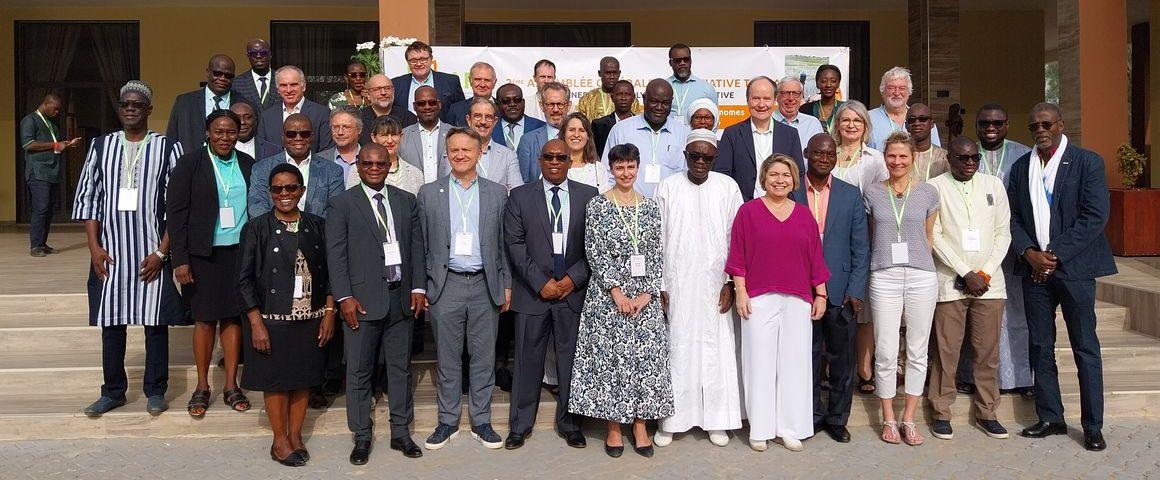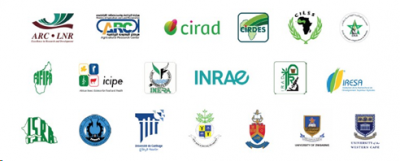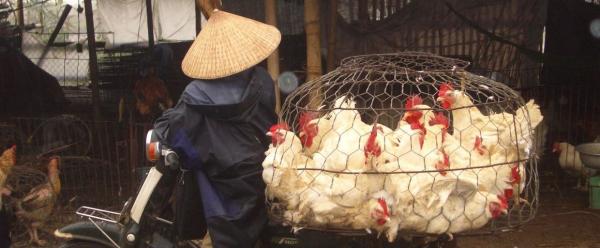Institutional news 21 January 2026
- Home
- Press area
- Press releases
- 2nd general assembly of the TSARA initiative
The TSARA initiative confirms its commitment to transforming agrifood systems through research and innovation in partnership with Africa

Participants in the second general assembly of the TSARA initiative in Dakar (Senegal) © I. Diallo, CIRAD
We, research organizations, universities, schools eges and sub-regional organizations in Africa and Europe affirm our determination to implement TSARA, a research and innovation partnership aimed at pooling knowledge, methods and networks and at co-building programmes and projects in support of grassroots players, public policy and international initiatives, to foster productive, resilient, autonomous and sustainable food systems.
Eight thematic groups under TSARA have been working through webinars since March 2022, bringing together up to 60 individuals from each of the 22 members. These groups assessed the state of scientific knowledge and identified priorities in areas such as soils, water, and forests under climate change constraints; the agroecological transition of agriculture and livestock; the sustainability of food systems; human, animal, and landscape health; and work and employment.
The second general assembly provided an opportunity to review actions taken since the first assembly and highlight collaborative activities among members. This has fostered a strong dynamic of information and exchanges within TSARA through participation in international events, field missions, project sequences, and seminars.
As examples of ongoing initiatives, pilot projects have recently been initiated, including MAHDIA focusing on the Water/Food/Agroecological Transition nexus, involving institutions from Morocco, Tunisia, Senegal, France, and the Metropolis of Montpellier. Another project, FAMA – Food And Microbiota in Africa, addresses nutrition from microbiota to public policies, with partners from South Africa, Senegal, and France.
A total of 12 starter or interknowledge projects have been implemented, and 14 have been launched, supported by incentives from INRAE and CIRAD. These include projects like Soil Africao, a research and training network on soil functionality in West Africa, involving partners from Benin, Burkina Faso, Ivory Coast, Senegal, and France, and Employae, dedicated to the Employment/Agroecological Transition nexus, involving partners from Ghana, Senegal, Burkina Faso, and France.
TSARA has committed funds to research projects, incoming and outgoing mobilities, and four jointly financed PhD scholarships (CIRAD INRAE). The resources provided by all partners, both human and financial, aim to strengthen TSARA's collective capacity to secure and succeed in projects at the European, African, and international levels.
The second general assembly also validated TSARA's scientific agenda and action plan aligned with the initiative's objectives to address global socio-economic and environmental challenges. It reinforced the organization of the scientific foundation, endorsed principles for opening TSARA to new members and synergies with existing ones, and laid the groundwork for establishing an External Advisory Committee (EAC) for TSARA. The EAC will consist of experts from Africa and Europe, as well as multilateral partners. A roundtable with five of these experts provided recommendations and laid the groundwork for the EAC.
About the TSARA Initiative - Transforming Food Systems and Agriculture through Research in Partnership with Africa:
TSARA is a research, training, and innovation partnership initiative with the aim of sharing knowledge, methods, and networks, as well as jointly develop programmes and projects to support African and European stakeholders and public policies. It contributes to major international initiatives connecting Africa, Europe, and other continents in the fields of agriculture, food, and the environment.
TSARA's objective is to strengthen research partnership collaborations to promote sustainable agriculture, food systems, pastoral and forest landscapes. It aligns with the joint goal of the AU and the EU to enhance collaborations, particularly scientific, between research organizations and higher education institutions in Africa and Europe.
TSARA aspires to open up to new partners, both African and European and possibly beyond. The governance and the charter, emphasizing commitments to openness, transparency, research ethics, as well as data ownership and sharing rules, together with the scientific vision and the collective dynamic ambitions expressed above, form the pillars of the consortium and the expected added values of the TSARA initiative.
www.initiative-tsara.org
The 22 members of TSARA
South Africa ARC
South Africa University of Pretoria
South Africa University of Western Cape
Benin University of Abomey Calavi
Burkina Faso INERA
Burkina Faso CIRDES
Cameroon IRAD
Ivory Coast INPHB/ESA
Egypt ARC
Kenya ICIPE
Madagascar University of Antananarivo
Madagascar FOFIFA
Mali IER
Morocco ENA Meknès
Regional – West Africa CILSS
Senegal UCAD
Senegal ISRA
Tunisia UCAR
Tunisia IRESA
Zimbabwe University of Zimbabwe
France INRAE
France Cirad
Three associate members were welcomed: Institut Agro (France), AgroParisTech (France), Gaston Berger University (Senegal)




























